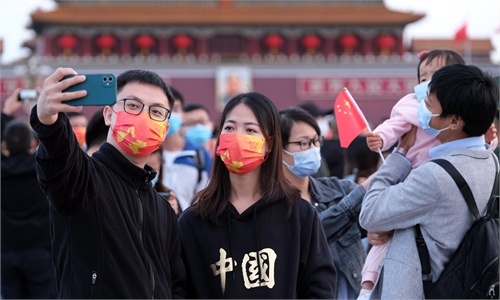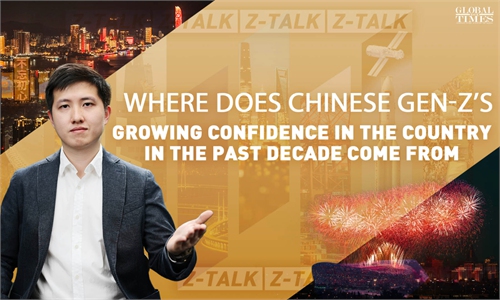China's Gen-Z shows more diversified preferences in job seeking, stronger awareness of labor rights: report

Peking University and career platform Zhaopin Ltd released a report on employer-employee relations in the digital era on October 22, 2022 at an unveiling ceremony in Peking University. Photo: Courtesy of Zhaopin Ltd
China's Generation-Z shows diversity in selecting jobs and has stronger awareness of defending their labor rights as new forms of careers continue to increase, said a report on relations between employers and employees released by Peking University on Wednesday.
The report was based on data from the job recruitment website operated by career platform Zhaopin Ltd. Research fellows from the National School of Development at Peking University and Zhaopin studied employees' job-hunting behavior and their feelings toward employment relations in the digital era.
According to the report, 9.8 percent of people born in the 2000s would like to be self-employed while the rate in the post-70s and post-80s generation was only 1.9 percent and 5 percent. There were fewer people born in the 2000s choosing to work in private companies compared with the older generations.
"It is not contradictory for some people of Gen-Z to pursue both stability and freedom at the same time. We have had a series of interviews with university graduates who want a stable position in government-related institutes or state-owned companies. Many of them said eight-hour working day jobs can give them spare time for their hobbies," said Li Qiang, vice president of Zhaopin at the unveiling ceremony.
There is an increasing number of occupations in new forms of employment. "Besides positions in information technology and the internet industry, the number of posts for package and order delivery, online games and livestreaming has also been growing since 2018 with a four-times increase in July 2022 compared with January 2022," the report pointed out.
The report found that Gen-Z paid much more attention to safeguarding their legitimate labor rights and interests even though they are the most vulnerable age group in China's social security system, which is basically made up of five different kinds of insurance - pension insurance, medical insurance, unemployment insurance, work-related injury insurance and childbirth insurance - and one mandatory housing fund.
"No matter what kind of insurance, people born after 2000 are left behind other generations. For example, only 59.1 percent of people born after 2000 have medical insurance while the medical insurance rate for all age groups is 76 percent," read the report.
But more than 70 percent of people born after 2000 would resist labor law violations, while only 42.7 and 46.3 percent of people born in the 1970s and 1980s would do the same thing.
Liu Aiyu, professor with the Department of Sociology at Peking University, said China's Gen-Z has much greater courage and confidence to fight against labor rights violations and other injustices in their jobs because many of them have financial support from their family and are not afraid of losing their job.
"China's Gen-Z grew up in a time when China made enormous economic and social development achievements. They are more confident and have higher requirements for workplace equality and rights protection," said Liu.



